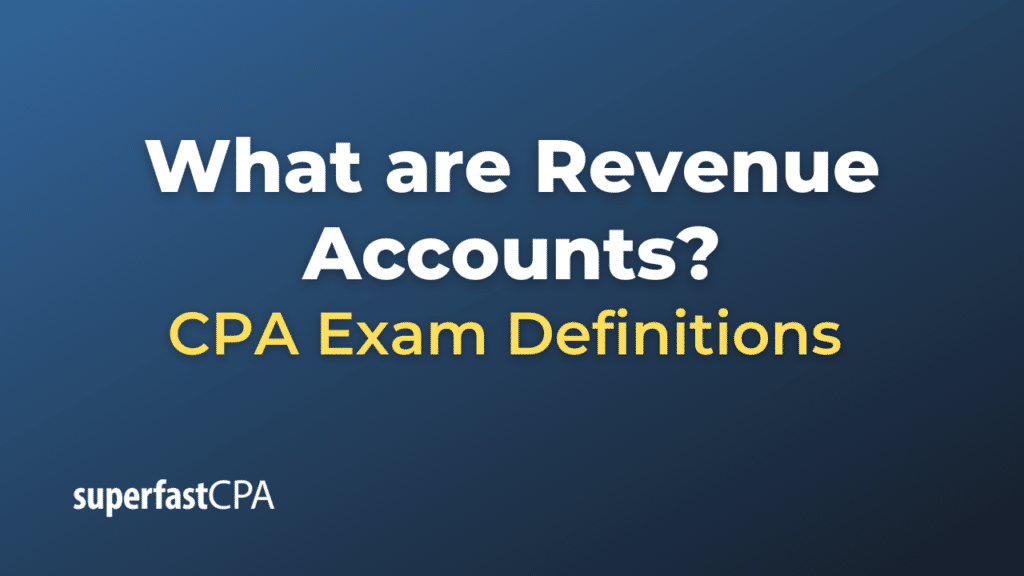Revenue Accounts
Revenue accounts are used in accounting to record and track the amounts of money a company earns from its primary business activities during a specific period. These accounts are credited when a company recognizes revenue and are an essential component of the income statement (or profit and loss statement). The balances in revenue accounts indicate the sales or service revenues earned during an accounting period.
Types of Revenue Accounts:
- Sales Revenue: This account is used by companies that sell goods. For example, a retailer would credit its sales revenue account when it sells merchandise to customers.
- Service Revenue: Service-based companies use this account. For instance, an accounting firm would credit its service revenue account when it provides consulting services to a client.
- Interest Revenue: Companies that earn interest income, such as from investments or lending money, use this account.
- Rental Revenue: This account is used by businesses that earn money from renting out properties, equipment, or other assets.
- Royalty Revenue: Companies that earn money from allowing others to use their intellectual property (like patents, copyrights, or trademarks) would record those earnings in a royalty revenue account.
- Dividend Revenue: This account is used by businesses that earn income from investments in the form of dividends from other companies’ stocks.
- Gain on Sale of Assets: While not a primary revenue source, companies use this account to record gains from selling assets other than inventory. For example, a gain from selling a building or a piece of equipment would be recorded here.
- Other Revenue: This account captures revenue streams that don’t fit neatly into the primary categories. For instance, a company might earn income from licensing its brand or from penalties and fines it charges its customers.
Example of Revenue Accounts
Let’s walk through a fictional example that illustrates the use of various revenue accounts for a company named “TechGlow Electronics,” which is involved in multiple business activities.
TechGlow Electronics: Revenue Transactions for the Month of March
- Sales of Electronic Goods: TechGlow sold electronic items worth $50,000 in March.
Accounting Entry:
- Debit Accounts Receivable: $50,000 (assuming all sales are on credit)
- Credit Sales Revenue: $50,000
- Service and Repair Fees: TechGlow offers repair services for electronic items. In March, they earned $8,000 from these services.
Accounting Entry:
- Debit Cash: $8,000 (assuming all customers paid in cash for services)
- Credit Service Revenue: $8,000
- Interest from Investments: TechGlow has made some investments in corporate bonds. They earned $1,500 as interest on these bonds in March.
Accounting Entry:
- Debit Cash: $1,500
- Credit Interest Revenue: $1,500
- Rental Income: TechGlow owns a small property that they rent to another retail business. They received $3,000 as rent for the month of March.
Accounting Entry:
- Debit Cash: $3,000
- Credit Rental Revenue: $3,000
- Sale of an Old Asset: TechGlow sold a piece of old machinery (that was no longer in use) for $5,000. They had originally purchased it for $4,000.
Accounting Entry:
- Debit Cash: $5,000
- Debit Accumulated Depreciation (assuming fully depreciated): $4,000
- Credit Machinery (asset account at historical cost): $4,000
- Credit Gain on Sale of Assets: $1,000
By the end of March, TechGlow’s revenue accounts will show:
- Sales Revenue: $50,000
- Service Revenue: $8,000
- Interest Revenue: $1,500
- Rental Revenue: $3,000
- Gain on Sale of Assets: $1,000
The total revenue TechGlow recognized in March is $63,500. This amount will be reported on the income statement for March, and expenses for the month will be subtracted from it to determine the net income or loss.
This example demonstrates how different types of business activities lead to revenues being recognized in various revenue accounts.













